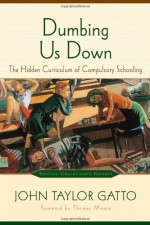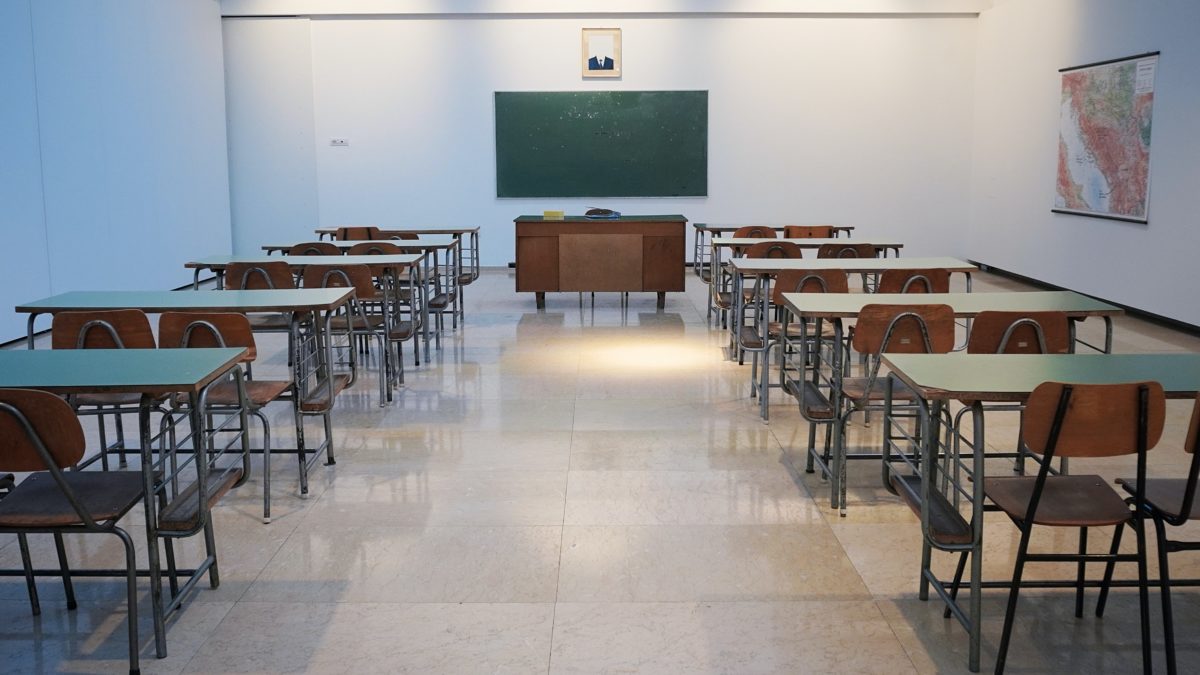
Dumbing Us Down: The Hidden Curriculum of Compulsory Schooling
-
Public Education
- at 26 July 2012
Book: Dumbing Us Down: the Hidden Curriculum of Compulsory Schooling
By JOHN TAYLOR GATTO
Reviewed by Samuel L. Blumenfeld
First Published The Blumenfeld Education Letter - May 1993
It Is Time to Try Something Different
NO one in America today is better qualified to report on the true condition of our government education system than John Taylor Gatto, the now-famous educator who spent 26 years teaching in six different schools in New York City and quit because he could no longer take part in a system that destroys lives by destroying minds.
In 1990 the New York “Senate named Mr. Gatto New York City Teacher of the Year. The speech he gave at that occasion, “The Psychopathic School,†amounted to a devastating indictment of public education (reprinted in BEL, May 1991, under the title “Why Schools Don’t Educateâ€). In 1991 Mr. Gatto was named New York State Teacher of the Year, at which occasion he gave a speech, “The Seven-Lesson Schoolteacher,†so insightful of the wrong-headedness of public education that it will probably become a classic in educational literature
These two remarkable speeches, plus several others, including one entitled “We Need Less School, Not More,†were published in book form last year. And what a powerful book it is, only 104 pages long, readable in one or two sittings. With Outcome-Based Education being imposed on schools across America, we will get much more school, not less, and the content of that schooling will produce far more confusion than we already have.
Gatto was born in Monongahela, Pennsylvania, an industrial river town forty miles southeast of Pittsburgh. He writes: “It was a place where independence, toughness, and self-reliance were honored, a place where pride in ethnic and local culture was very intense. It was an altogether wonderful place to grow up, even to grow up poor.†Gatto’s grandfather was the town printer and for a time, the publisher of the town newspaper, The Daily Republican, a source of independent thinking in a stronghold of the Democratic party.
The move from Monongahela to Manhattan was quite a jolt for Gatto. The difference in society and values turned Gatto into an anthropologist and in the next twenty-six years he used his classes “as a laboratory where I could learn a broader range of what human possibility is…and also as a place where I could study what releases and what inhibits human power.
Like so many university students, Gatto was taught by his professors that intelligence and talent were distributed throughout the population in bell curve predictability. But his experience as a teacher taught him differently. He writes:
The trouble was that the unlikeliest kids kept demonstrating to me at random moments so many of the hallmarks of human excellence—insight, wisdom, justice, resourcefulness, courage, originality—that I became confused. They didn’t do this often enough to make my teaching easy, but they did it often enough that I began to wonder, reluctantly, whether it was possible that being in school itself, was what was dumbing them down. Was it possible I had been hired not to enlarge children’s power, but to diminish it? That seemed crazy on the face of it, but slowly I began to realize that the bells and confinement, the crazy sequences, the age-segregation, the lack of privacy, the constant surveillance, and all the rest of the national curriculum of schooling were designed exactly as if someone had set out to prevent children from learning how to think, and act, to coax them into addiction and dependent behavior.
These insights led Gatto to develop a teaching style completely opposite to the methodology taught in the university. He writes:
Bit by bit I began to devise guerilla exercises to allow the kids I taught—as many as I was able—the raw material people have always used to educate themselves: privacy, choice, freedom from surveillance, and as broad a range of situations and human associations as my limited power and resources could manage….I dropped the idea that I was an expert, whose job it was to fill the little heads with my expertise, and began to explore how I could remove those obstacles that prevented the inherent genius of children from gathering itself.
Naturally, Gatto’s methods put him more and more at odds with the system. He explains:
The sociology of government monopoly schools has evolved in such a way that a premise like mine jeopardizes the total institution if it spreads….But once loose the idea could imperil the central assumptions which allow the institutional school to sustain itself, such as the false assumption that it is difficult to learn to read, or that kids resist learning, and many more.
In his speech, “The Seven-Lesson Schoolteacher,†Gatto describes the seven lessons that are taught in all public schools by all teachers in America, whether they know it or not. He writes:
The first lesson I teach is confusion. Everything I teach is out of context. I teach the un-relating of everything. I teach dis-connections….Even in the best of schools a close examination of curriculum and its sequences turns up a lack of coherence, full of internal contradictions….Confusion is thrust upon kids by too many strange adults, each working along with only the thinnest relationship with each other, pretending, for the most part, to an expertise they do not possess….In a world where home is only a ghost, because both parents work…or because something else has left everybody too confused to maintain a family relation, I teach you how to accept confusion as your destiny.
The second lesson I teach is class position….The children are numbered so that if any get away they can be returned to the right class….My job is to make them like being locked together with children who bear numbers like their own.…If I do my job well, the kids can’t even imagine themselves somewhere else, because I’ve shown them how to envy and fear the better classes and how to have contempt for the dumb classes….That’s the real lesson of any rigged competition like school. You come to know your place.
The third lesson I teach is indifference….When the bell rings I insist they drop whatever it is we have been doing and proceed quickly to the next work station. They must turn on and off like a light switch….Bells inoculate each undertaking with indifference.
The fourth lesson I teach is emotional dependency. By stars and red checks, smiles and frowns, prizes, honors, and disgraces, I teach kids to surrender their will to the predestinated chain of command.
The fifth lesson I teach is intellectual dependency….It is the most important lesson, that we must wait for other people better trained than ourselves, to make the meanings of our lives….[Only], the teacher can determine what my kids must study, or rather, only the people who pay me can make those decisions, which I then enforce. If I’m told that evolution is a fact instead of a theory, I transmit that as ordered, punishing deviants who resist what I have been told to tell them to think….Successful children do the thinking I assign them with a minimum of resistance and a decent show of enthusiasm….Bad kids fight this, of course, even though they lack the concepts to know what they are fighting, struggling to make decisions for themselves about what they will learn and when they will learn it…Fortunately there are tested procedures to break the will of those who resist; it is more difficult, naturally, if the kids have respectable parents who come to their aid, but that happens less and less in spite of the bad reputation of schools. No middle-class parents I have ever met actually believe that their kid’s school is one of the bad ones. No one single parent in twenty-six years of teaching.
The sixth lesson I teach is provisional self-esteem….The lesson of report cards, and tests is that children should not trust themselves or their parents but should instead rely on the evaluation of certified officials. People need to be told what they are worth.
The seventh lesson I teach is that one can’t hide. I teach students they are always watched, that each is under constant surveillance by myself and my colleagues….The meaning of constant surveillance and denial of privacy is that no one can be trusted, that privacy is not legitimate.
OBE and the Seven Lessons
It is obvious that Outcome-Based Education will reinforce the seven deadly lessons. Confusion will be taught by the arbitrary content of the curriculum, beginning with whole language and invented spelling and ending with a confusing mishmash called social-studies. Class position will be enhanced by separating the gifted and talented (the rulers of tomorrow) from the vocational proles whose future place in society will have been determined by the pyscho-visionaries of OBE. Indifference will be reinforced through mastery learning which turns the student into a parrot who must demonstrate what he has learned in order to move up to the next level. Emotional dependency will be instilled since the student-prisoner will have to demonstrate competency in what he has learned in order to be released from compulsory attendance, no matter how old he is. Intellectual dependency will be taught by the requirement that the student learn exactly what he or she had been taught. The OBE visionaries will determine what vocation, what lifestyle that student will have and will design the curriculum to fit that predetermined future. Provisional self-esteem will be taught in order to get the student to do what the pyscho-educators require, or else. And finally the student will discover that in OBE no one can hide because the student will be monitored as closely as any prisoner in a penitentiary and a permanent record will be kept in the federal computer available to all future controllers.
In other words, what Gatto now sees as a stifling, inhuman education system will simply get worse and more oppressive under the OBE plan. Can the system be reformed? Gatto writes:
The current debate about whether we should have a national curriculum is phony. We already have a national curriculum locked up in the seven lessons I have just outlined. Such a curriculum produced physical, moral, and intellectual paralysis, and no curriculum of content will be sufficient to reverse its hideous effects….Schools teach exactly what they are intended to teach and they do it well: how to be a good "Egyptian and remain in your place in the pyramid…"
Look again at the seven lessons of school teaching...all of these lessons are prime training for permanent underclasses, people deprived forever of finding the center of their own special genius.
Of course, things were not always this way. Back in the 1930’s, when your editor attended public school in New York City, one was taught to read, write and do arithmetic in a well-organized, systematic, traditional way. There was no confusion in what we were being taught. In studying American history, we started at the beginning and proceeded chronologically to the current period. It all made sense. The same was true of every other subject. Whatever was taught was very much worth learning. Nor was the teacher interested in how we felt, or what the political leanings of our parents were, or what our values were. These were clearly no concern of hers. Gatto writes:
Only a few lifetimes ago things were very different in the United States. Originality and variety were common currency; our freedom from regimentation made us the miracle of the world; social-class boundaries were relatively easy to cross; our citizenry was marvelously confident, inventive and able to do much for themselves independently, and to think for themselves. We were something special, we Americans, all by ourselves, without government sticking its nose into and measuring every aspect of our lives, without institutions and social agencies telling us how to think and feel….[T]here are some studies that suggest literacy at the time of the American Revolution, at least for non-slaves on the Eastern seaboard, was close to total. Thomas Paine’s Common Sense sold 600,000 copies to a population of 3,000,000, 20 percent of whom were slaves and 50 percent indentured servants….
It becomes obvious that the institution of government education itself did much to lead us away from the values of independence and self-reliance that governed America in its early days. And the only way to recapture these values is to get the government out of the education business. Gatto writes:
The character of large compulsory institutions is inevitable; they want more and more until there isn’t any more to give. School takes our children away from any possibility of an active role in community life—in fact it destroys communities by relegating the training of children to the hands of certified experts—and by doing so it ensures our children cannot grow up fully human.
Is there a solution to the problem? Gatto offers the same solution this writer has been advocating for the last ten years. He writes:
Some form of free-market system in public schooling is the likeliest place to look for answers, a free market where family schools and small entrepreneurial schools and religious schools and crafts schools and farm schools exist in profusion to compete with government education. I’m trying to describe a free market in schooling exactly like the one the country had until the Civil War, one in which students volunteer for the kind of education that suits them, even if that means self-education; it didn’t hurt Benjamin Franklin that I can see….
After an adult lifetime spent teaching school, I believe the method of mass-schooling is its only real content. Don’t be fooled into thinking that good curriculum or good equipment or good teachers are the critical determinants of your son’s or daughter’s education. All the pathologies we’ve considered come about in large measure because the lessons of school prevent children keeping important appointments with themselves and with their families to learn lessons in self-motivation, perseverance, self-reliance, courage, dignity, and love—and lessons in service to others, too, which are among the key lessons of home and community life.
Finally, Gatto ends his discourse with this memorable line:
School is a twelve-year jail sentence where bad habits are the only curriculum truly learned. I teach school and win awards doing it. I should know.
The Time Factor
Gatto has some interesting things to say about time in his essay, “We Need Less School, Not More.†He writes:
A surprising number of otherwise sensible people find it hard to see why the scope and reach of our formal schooling networks should not be increased—by extending the school day or year, for instance—in order to provide an economical solution to the problems posed by the decay of the American family. One reason for their preference, I think, it that they have trouble understanding the real difference between communities and networks, or even the difference between families and networks.…
Networks like schools are not communities, just as school training is not education. By pre-empting 50 percent of the total time of the young, by locking young people up with other young people exactly their own age, by ringing bells to start and stop work, by asking people to think about the same thing at the same time in the same way, by grading people the way we grade vegetables—and in a dozen other vile and stupid ways—network schools steal the vitality of communities and replace it with an ugly mechanism. No one survives these places with their humanity intact, not kids, not teachers, not administrators, and not parents….
The feeding frenzy of formal schooling has already wounded us seriously in our ability to form families and communities, by bleeding away time we need with our children and our children need with us. That’s why I say we need less school, not more….
Schools stifle family originality by appropriating the critical time needed for any sound idea of family to develop—then they blame the family for its failure to be a family.
The distinction Gatto makes between “institutions and networks†and “families and communities†is a very important one. He writes:
Those of you who remember the wonderful closeness possible in army camp life or sports teams, and who have now forgotten those you were once close with, will understand what I mean. In contrast, have you ever forgotten an uncle or an aunt?
And perhaps that is one reason why homeschooling is becoming so popular. It consists of rediscovering the values of family life, values that had been inadvertently lost in the “feeding frenzy†of public education. And what the visionaries of Outcome-Based Education want is to steal more and more from the family so that the family resembles what’s left of an orange after the juice has been sucked out. Gatto writes:
I belong to some networks myself, of course, but the only ones I consider completely safe are the ones that reject their communal façade, acknowledge their limits, and concentrate solely on helping me do a specific and necessary task. But a vampire network like a school, which tears off huge chunks of time and energy needed for building community and family—and always asks for more—needs to have a stake driven through its heart and be nailed into its coffin.
No matter how good the individuals are who manage an institution, institutions lack a conscience because they measure by accounting methods….The deepest purposes of these gigantic networks is to regulate and to make uniform. Since the logic of family and community is to give scope to variety around a central theme, whenever institutions intervene significantly in personal affairs they cause much damage.
And that explains why Outcome-Based Education is so evil because it insists on destroying the independence of the family and the individualism of the child. Whatever the school does can only be done at the expense of the family.
And that also explains why the education establishment is so hostile to homeschooling because it represents the family reasserting itself, taking back its power and integrity and educative functions and rejecting the institution which has indeed become, as Gatto describes, a vampire. “Perhaps,†he suggests, “it is time to try something different.â€
Recent posts
-

Sensitive Curriculum Information Letter - Muslim Family
10 June 2024 -

Ontario Parents: Keep Your Kids Home June 3 to 7 and Reach Out to Your MPPs and PC Leadership Now
23 May 2024 -

PC Ontario Budget: Our Two Points Suggestions on Education
31 March 2024 -

Parents, Act Now: This Weekend's PC Policy Conference – Reach Out to Your PC MPPs
30 January 2024 -

FIX it Now: A One-Year Public School Protest
23 September 2023 -

One Million March for Children, New Gender Identity in Schools
18 September 2023
